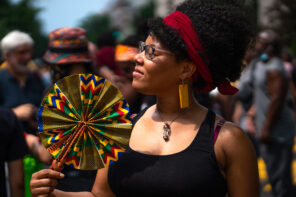Thirty-six years ago, as Americans prepared to celebrate Thanksgiving, a Catholic, a Protestant, and a Jew went to Washington, D.C. There, alongside President Jimmy Carter, they appealed to the American public to contribute to the cause of aiding war refugees from Vietnam, Cambodia, and Laos. President Carter asked that “every Saturday and Sunday in the month of November, up until Thanksgiving, be set aside as days for Americans in their synagogues and churches, and otherwise, to give generously to help alleviate this suffering.”
The event celebrated not only American compassion, but also a particular vision of benevolent pluralism in a unified, tri-faith America. Father Theodore Hesburgh, president of the University of Notre Dame and one of the Catholic representatives at the event, praised the fact that “so many different religious groups, often in conflict in the past, stand together as brothers and sisters” and were working “to pool their efforts, their enthusiasm, commitment and zeal.” Rabbi Bernard Mandelbaum, striking a similar note of religious harmony, proposed a Thanksgiving dinner where Protestant, Catholic, and Jewish people would gather to eat “what a typical Cambodian eats on a day when he’s starving.”
Americans responded in full force to these calls to “welcome the stranger.” Between 1975 and 2000, the United States resettled over one million refugees from Vietnam, Cambodia, and Laos, in a public-private endeavor funded in part by government but powered largely by private resources and the contributions of everyday Americans. Religious voluntary agencies—the organizations that have official contracts with the State Department to provide initial resettlement services—proved indispensable in this effort, and by 1981, Christian and Jewish voluntary agencies were responsible for nearly three-quarters of all Southeast Asian refugee cases.
These agencies performed critical functions in the resettlement system: they aided refugees in the camps overseas, helped to prepare refugees for a new life in America, and secured sponsorships by individuals and organizations. At the local level, congregations provided abundant manpower, material resources, and moral commitment. Volunteers sheltered and fed refugees, helped them learn English and find jobs, and provided guidance in navigating all areas of American life, from public transit to medical care.
The Indochinese Refugee Assistance Program had its challenges. Members of Congress worried that security screening measures were weak and would allow communist subversives and war criminals to sneak into the country as refugees. Americans worried that this largely non-white, non-Christian refugee group would fail to assimilate, drain public resources, and exacerbate unemployment. Public opinion polls showed that the majority of Americans were wary of accepting refugees for resettlement.
On the whole, though, the Indochinese Refugee Assistance Program was a success. The Vietnamese, Cambodian, Lao, and Hmong Americans who first arrived forty years ago could have been left languishing in camps—but instead are productive members of American society who serve our communities as physicians, teachers, government leaders, and officers in our military. They are proof that our nation’s resettlement system works, and that good can come when we choose to be our better selves.
Today, as was the case in 1979, religious leaders have set aside their divisions and have stood united in their strong commitment to aid and resettle Syrian refugees. Last week, as Congress debated the fate of Syrian refugee resettlement, organizations representing the entire gamut of American religious communities—Muslims and Jews, evangelicals and Unitarians, Catholics and Hindus—spoke with one clear voice: “To turn our back on refugees would be to betray our nation’s core values,” they said. “It would send a demoralizing and dangerous message to the world that the United States makes judgments about people based on the country they come from and their religion.” This expression of benevolent pluralism in a multi-faith America would make Hesburgh and Mandelbaum proud.
But what is missing this time around is the shared commitment of government. The cooperation between religious communities and government—so vividly on display in the fall of 1979—has broken down. Refugee resettlement has emerged as a starkly partisan issue, and government leaders at all levels have forcefully opposed resettling Syrian refugees. In the wake of the attacks in Paris, thirty-one governors have refused to accept Syrian refugees for resettlement, and 289 House of Representatives voted last week to halt the resettlement of Syrian refugees. Politicians have proposed applying religious tests to screen refugees and accepting only Christians, creating a national database to track Muslims, and using the National Guard to round up Syrian refugees.
The Thanksgiving celebration proposed by Carter, Hesburgh, and Mandelbaum thirty-six years ago rings familiar to us today, with its calls for interfaith compassion. Yet that moment of a united response to suffering is also so far away. Religious communities have welcomed refugees with open arms, but whether or not government will do its part and heed religious communities’ calls to show generosity and compassion is something we must reflect on as gather and feast this week.




